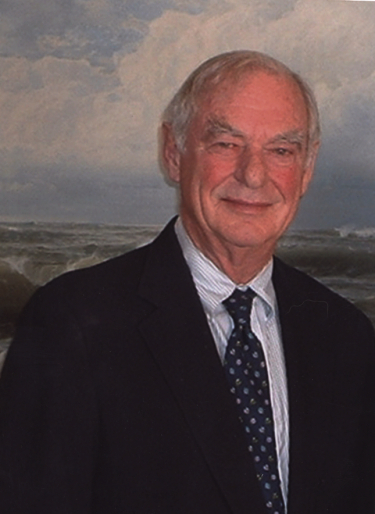Harold F. Lenfest*
Class of 2006
- President The Lenfest Group
- The Lenfest Scholars Foundation

Take every opportunity to learn and develop personal traits that will serve you well in life.
Gerry Lenfest was born in Jacksonville, Florida, and was raised in the suburbs of New York City. His father sold diesel engines, and his mother was a homemaker. Lenfest remembers those years as happy and family-oriented, but his life changed quickly when his father purchased a farm in Hunterdon County, New Jersey.
"Working on a farm was not my dream," says Lenfest. "My father still commuted 60 miles to work each day, so milking the cows and most other chores fell to me." But real tragedy struck shortly afterwards when Lenfest's mother died suddenly of a cerebral hemorrhage. "The loss of my mother was wrenching," says Lenfest. "She was a wonderful mother, and my world changed forever after she passed away."
Lenfest's twin sister was sent away to boarding school, and a woman was hired to take care of Lenfest and to help with the farm work. "My father continued to travel extensively for his job, and I felt completely alone," he says. "I had no vision of a positive future."
Soon, his studies began to suffer. Lenfest was sent away to a private high school in rural Pennsylvania, but he did not do well there either and was told not to return. Finally, his father was able to get him into Mercersburg Academy provided he repeat his freshman year. This school, with its structure and dedicated faculty, changed Lenfest's life. He became an excellent student and began to think positively about his future for the first time since his mother's death.
Each summer, Lenfest had various jobs, including a stint as a farmhand in Iowa. He also worked on a ship as a seaman. He earned an economics degree from Virginia's Washington and Lee University, and he worked each summer as a roughneck in the oil industry. He joined the U.S. Navy and eventually was given command of a destroyer escort, which he enjoyed immensely. When he took over the ship, it had the worst record in the squadron, but thanks to Lenfest's innate leadership abilities, the crew won every award in the Atlantic fleet. He served actively for two years and spent 24 years in the reserves. He was honorably discharged with the rank of captain.
Lenfest earned a law degree from Columbia University and began practicing with the New York law firm of Davis Polk & Wardwell LLP. Seven years later, he became house counsel for Walter Annenberg's Triangle Publications, Inc. in Philadelphia, which included Seventeen magazine. Five years later, Annenberg sold his radio and television stations and created a new division that included the magazine and his cable properties. He appointed Lenfest to head the new group.
"I went from being an attorney to being the head of a teenage girls' magazine," says Lenfest. "When I took over in 1970, it had primarily been a fashion magazine, but the grunge look of the 1970s wasn't fashion-oriented, and the circulation had dropped below the advertising rate base." Lenfest spent much of his time revamping the editorial content, featuring articles about personal goals and growth. He got circulation back up and describes his three years with the magazine as an exciting time. But Lenfest saw real opportunity when Annenberg decided to sell his company's cable television systems.
Lenfest did not have any money of his own to invest, but he found two investors in Lebanon, Pennsylvania, who would put up enough money to buy that town's cable systems, with the promise that Lenfest would double their money within five years. As a result, Lenfest was instrumental in revamping the modern cable television industry. He grew Suburban Cable from about 7,000 customers in 1975 to more than one million when it was sold. Suburban Cable was part of Lenfest Communications, Inc., a diversified communications, entertainment, and media company with U.S. and foreign holdings. Lenfest was recognized in 1995 as a cable television pioneer for his contributions to the industry.
"You need to be a person of your word and have the respect of others," he advises young people. "You should always try to do the right thing and live by the Golden Rule of treating others the way you yourself would like to be treated. You know you are successful when you feel good about the way you have conducted yourself in business and in your personal life."
Lenfest is an ardent supporter of education. He credits Mercersburg Academy with turning his life around. "The education programs of the Horatio Alger Association fit my own philosophy, and I am honored to be a part of that now. A lot of successful people have received this award, and I am doubly honored to follow them," he says, praising the Association's book, Only in America. "That's what my story illustrates," he explains. "Only in this country could I have achieved the success I have achieved. In this country, you have the freedom to become what you want, and that freedom gives you one opportunity after another to succeed."
